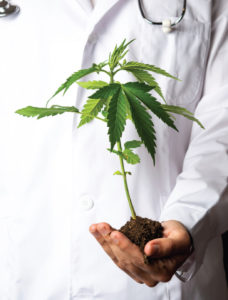By Craig Tomashoff
 Sit too close to the TV and you’ll ruin your eyesight. Go swimming less than an hour after eating and you’ll cramp up. Make a weird face and it’ll stick like that. Whether they were meant to terrify us or soothe us, these urban legends and many more have long been a part of our lives. So it should come as no surprise that a mythology has also sprung up around cannabis. So many questionable myths have hung around for so long, it’s hard to know what’s true and what are remnants from the Reefer Madness era. To clear things up, we asked two experts in the field-Emma Chasen, veteran cannabis educator and industry consultant: and Dr. Adie Rae, co-founder of Habu Health, one of the country’s leading cannabis research groups-to help separate weed fact from fiction.
Sit too close to the TV and you’ll ruin your eyesight. Go swimming less than an hour after eating and you’ll cramp up. Make a weird face and it’ll stick like that. Whether they were meant to terrify us or soothe us, these urban legends and many more have long been a part of our lives. So it should come as no surprise that a mythology has also sprung up around cannabis. So many questionable myths have hung around for so long, it’s hard to know what’s true and what are remnants from the Reefer Madness era. To clear things up, we asked two experts in the field-Emma Chasen, veteran cannabis educator and industry consultant: and Dr. Adie Rae, co-founder of Habu Health, one of the country’s leading cannabis research groups-to help separate weed fact from fiction.
MARIJUANA REDUCES SEX DRIVE
False In fact, while too high a dose of cannabis could lead to conditions that aren’t exactly turn-ons, like drowsiness, anxiety, and/or paranoia, the appropriate dose might actually improve your sex life. “For females with low libido, cannabis appears to be a viable therapy to enhance it,” says Rae. Chasen agrees that it can up your sex drive because marijuana “increases blood flow and there are endocannabinoid receptors densely populated in our reproductive systems, increasing sensation and often diminishing pain.”
MARIJUANA STAYS IN YOUR SYSTEM
FOR 30 DAYS
True Cannabinoids are lipids, which are the same thing that your fat tissue is made of. This means that when you ingest cannabis, its molecules get stored in your body’s fat tissue. Rae says that those who use cannabis more than twice a week can expect to have detectable levels of it in their urine for up to 30 days, although there is a lot of variability, depending a person’s body metabolism and physiology.
MARIJUANA IS HIGHLY ADDICTIVE
Mostly False If you want to talk about substances that encourage addiction, Rae suggests discussing nicotine or alcohol instead, since they are the real offenders. Chasen does point out that to be technically addictive, a substance must produce a measurable withdrawal and tolerance-which cannabis does. “Withdrawal symptoms may leave you grumpy, in some pain and not able to sleep, but they definitely won’t kill you. And while tolerance can be developed to the psychoactivity of THC, tolerance to the benefits of THC cannot. Therefore, THC can be considered addictive but it’s not addiction that will likely ruin your life.”
MARIJUANA CAUSES SHORT-TERM MEMORY LOSS
Somewhat True According to Rae, “THC impairs some kinds of cognitive function but not others.” However, she adds that THC’s impact on memory formation is “largely dose-dependent.” The effects of low doses of THC have not been measured. Chasen adds that while excessive THC “may lead to short-term memory loss,” especially in young adults, there are compounds in cannabis (particularly one called pinene) that can offset this potential problem.
ALL CBD OILS ARE THE SAME
False With hemp-derived CBD products flooding the market, buyers need to be wary of what they’re getting. “Craft hemp,” as it’s often called (a la “craft beer”), may be everywhere but according to Rae, it also has less than .3 percent THC. There’s still a wide range of therapeutically valuable molecules in there even with virtually no THC. However, the highest-quality CBD oils feature what she says is a “full spectrum” of ingredients that come from organically grown cannabis and not “the fibers industrial hemp that contains minimal beneficial ingredients.”
YOU CAN OVERDOSE
ON MEDICAL CANNABIS
True and False Technically, says Chasen, this is possible – if you define overdose as simply taking too much of a substance. “Operating with this definition, a lot of people overdose on cannabis and have anxious, paranoid experiences,” she explains, adding that “you cannot lethally overdose on cannabis. There are CB1 receptors in brainstem cardiorespiratory centers, which means cannabis cannot shut down essential functions such as breathing and heartbeat. To date, there have been no reported deaths due to an overdose of cannabis.”
MAJOR MEDICAL ORGANIZATIONS
DON’T SUPPORT MEDICAL MARIJUANA USE
True There is a qualification to this, however. The reluctance of organizations like the American Medical Association to get onboard with cannabis has more to do with the fact that it is still federally prohibited and there’s next to no endocannabiology education in medical schools, than because of any inherent mistrust of the plant. “This is slowly evolving,” explains Rae. “The AMA and other large medical societies have too much to lose in terms of federal credibility to amend their policies.”
MARIJUANA CAUSES GYNECOMASTIA
False It’s highly unlikely pot causes male breast development, but Rae admits there is “very sparse evidence” for this belief dating back at least to the 1960s. She cites a case report from the ‘70s and another from 2007 that found THC had effects on both male and female gonadal hormones. But she ads, “these are very complex interactions. Some individuals may be more at risk than others. It may also be dose-dependent, but no studies have been done.” Chasen says that cannabis shouldn’t be a direct cause of gynecomastia, which is a disorder caused by hormonal imbalance.
CBD CAN CURE ANYTHING
False Even cannabis’ most passionate supporters admit CBD has its limits. “It’s a compound with large therapeutic potential,” says Chasen. “However, to improve efficacy, it must be taken in a holistic context. CBD won’t cure you of anything and it may not even help you if you continue to sacrifice health and care in other areas of your life.” Still, Rae adds, CBD does have a “very powerful placebo effect,” which can be a “psychological tool for managing chronic disease. Allowing your brain to think that a substance is going to work is often more powerful than the substance itself.”
MARIJUANA LEADS TO HARDER DRUGS
False Marijuana opponents have long called it a “gateway” drug, but Chasen sees that more as a social trait of cannabis rather than a physical one. “From a social behavior examination, people who consume cannabis may have traditionally been more likely to consume other illicit substances,” he says. “But from a physiological perspective, cannabis doesn’t lead to harder drugs. It does not cause a change in the boy that would make it more likely for people to seek out other, more dangerous substances.” Likewise, Rae admits that while cannabis use is “correlated with the use of harder drugs, so are alcohol use and nicotine use. ‘Correlation’ and ‘causation’ are not the same.”
Florida Medical Marijuana Health Center
700 W Boynton Beach Blvd, Suite 102, Boynton Beach, FL 33426
(561) 223-0743 • flamjcenter.com
Check Also
Trusted Homecare Agency: Serving Veterans with Free Supplemental Home Healthcare
When it comes to healthcare, veterans deserve the best care possible. For veterans seeking in-home …
 South Florida Health and Wellness Magazine Health and Wellness Articles
South Florida Health and Wellness Magazine Health and Wellness Articles




